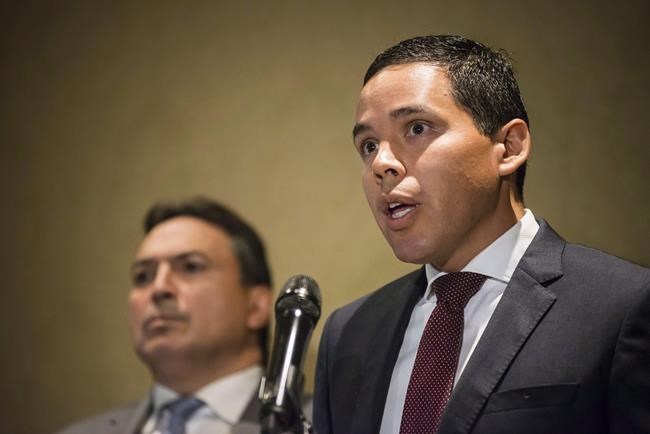The national organization representing Inuit has developed a plan with Mounties to help improve their relationship.
Natan Obed, president of Inuit Tapiriit Kanatami, said his people have long faced discrimination, neglect and violence within the criminal justice system.
"Whenever Inuit interact with the RCMP, we have that history and the weight of that intergenerational trauma in the relationship," Obed said Thursday from Ottawa.
Interactions with police have been strained, but the plan brings hope of a new relationship, he said.
Development began after a meeting with RCMP Commissioner Brenda Lucki last year. A joint news release from RCMP and Inuit Tapiriit Kanatami said the plan is a starting point of a collaborative relationship to address gaps in policing.
The goal is to build transparency and trust, the release said.
Parts of it flow from recommendations in the National Inuit Action Plan, which are the Inuit priorities from the National Inquiry into Missing and Murdered Indigenous Women and Girls.
"Mutual trust, respect and empathy are fundamental components in building healthy relationships between police and Inuit communities," Lucki said in the news release.
There has been a significant public distrust of police in Nunavut for a long time. RCMP killed Inuit sled dogs between the 1950s and 1970s as part of a federal plan to have people abandon their traditional lifestyles.
In recent years there have been other high profiles cases, including video of a Nunavut RCMP officer hitting an Inuk man with his truck’s door in 2020.
Lucki said the RCMP is committed to implementing the plan to repair, rebuild and enhance the relationship with communities in Inuit Nunangat, the region that makes up the homeland of Inuit.
Public Safety Minister Marco Mendicino said in a statement that walking the road to reconciliation means fostering new relationships.
"Ones which address the wrongs of the past, make a meaningful difference in the present and meet the shared challenges of the future," he said.
The plan includes having regular consultations with Inuit leadership to monitor progress.
It also includes a goal of increased Inuit representation on the force and mandatory cultural training for officers working in northern regions.
Nunavut has seen a high number of police shootings in recent years that have caused concern in Inuit communities. Southern police forces are tasked to investigate those shootings and in most cases, little information is released.
Obed said the new plan also aims to develop RCMP investigative strategies and the way that information will be shared.
Transparency is necessary to improve trust, he added.
Obed said there will also be strategies to work with Mounties on the response to suicide and self-harm calls. Obed said it is the second-most common call for RCMP services in Nunavut.
Obed said there are challenges, but the RCMP has a very positive role to play in ensuring Inuit communities are safe. It will take time and energy to build a better relationship, he added.
The Mounties are expected to provide funding for implementation of the plan. No specific amount has been highlighted.
"For our communities to ... be our best, it makes sense for us to have a better relationship with the RCMP," Obed said.
This report by The Canadian Press was first published April 28, 2022.
Kelly Geraldine Malone, The Canadian Press




